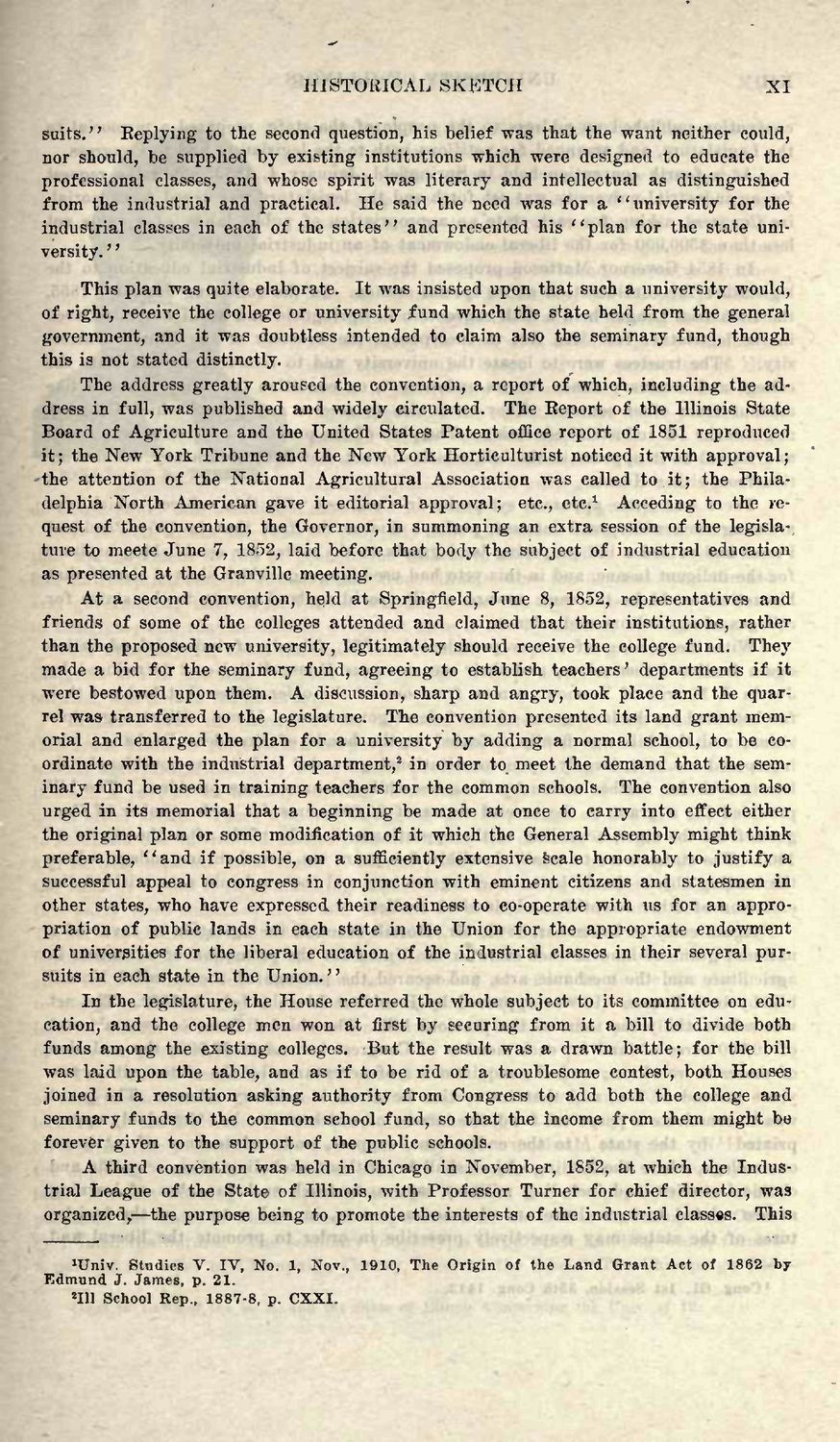| |
| |
Caption: Book - Early History of University (1916)
This is a reduced-resolution page image for fast online browsing.

EXTRACTED TEXT FROM PAGE:
HISTORICAL SKETCH XI s u i t s . " Replying to the second question, his belief was that the want neither could, nor should, be supplied by existing institutions which were designed to educate the professional classes, and whose spirit was literary and intellectual as distinguished from the industrial and practical. He said the need was for a "university for the industrial classes in each of the s t a t e s " and presented his " p l a n for the state university. ' ' This plan was quite elaborate. I t was insisted upon that such a university would, of right, receive the college or university fund which the state held from the general government, and it was doubtless intended to claim also the seminary fund, though this is not stated distinctly. The address greatly aroused the convention, a report of which, including the address in full, was published and widely circulated. The Report of the Illinois State Board of Agriculture and the United States Patent office report of 1851 reproduced i t ; the New York Tribune and the New York Horticulturist noticed it with approval; -the attention of the National Agricultural Association was called to i t ; the Philadelphia North American gave it editorial approval; etc., etc. 1 Acceding to the request of the convention, the Governor, in summoning an extra session of the legisla-, tine to meete June 7, 1852, laid before that body the subject of industrial education as presented at the Granville meeting. At a second convention, held at Springfield, June 8, 1852, representatives and friends of some of the colleges attended and claimed that their institutions, rather than the proposed new university, legitimately should receive the college fund. They made a bid for the seminary fund, agreeing to establish teachers' departments if it were bestowed upon them. A discussion, sharp and angry, took place and the quarrel was transferred to the legislature. The convention presented its land grant memorial and enlarged the plan for a university by adding a normal school, to be coordinate with the industrial department, 8 in order to_ meet the demand that the seminary fund be used in training teachers for the common schools. The convention also urged in its memorial that a beginning be made at once to carry into effect either the original plan or some modification of it which the General Assembly might think preferable, " a n d if possible, on a sufficiently extensive scale honorably to justify a successful appeal to congress in conjunction with eminent citizens and statesmen in other states, who have expressed their readiness to co-operate with us for an appropriation of public lands in each state in the Union for the appropriate endowment of universities for the liberal education of the industrial classes in their several pursuits in each state in the Union.'' In the legislature, the House referred the whole subject to its committee on education, and the college men won at first by securing from it a bill to divide both funds among the existing colleges. But the result was a drawn battle; for the bill was laid upon the table, and as if to be rid of a troublesome contest, both Houses joined in a resolution asking authority from Congress to add both the college and seminary funds to the common school fund, so that the income from them might be forever given to the support of the public schools. A third convention was held in Chicago in November, 1852, at which the Industrial League of the State of Illinois, with Professor Turner for chief director, was organized,—the purpose being to promote the interests of the industrial classes. This 'Univ. Studies V. IV, No. 1, Nov., 1910, The Origin of the Land Grant Act of 1862 by Edmund J. James, p . 2 1 . *I11 School Rep., 1887-8, p. CXXI.
| |